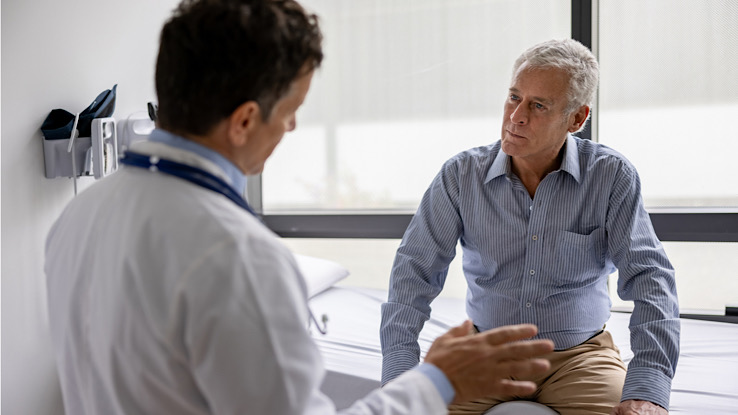What Can Cause Rectal Bleeding? Causes, Diagnosis, and Treatment

If you have notice dark or bright red blood after a bowel movement, this is known as rectal or anal bleeding. While blood in your stool or on the toilet paper after you wipe can be a concerning sight to see, there are many potential causes of rectal bleeding. Most conditions that cause rectal bleeding aren’t severe and may resolve over time with appropriate self-care measures. However, sometimes more serious conditions can cause blood to appear in your stool, so it is important to speak with your doctor if you have this issue. Frequent or heavy rectal bleeding requires prompt medical attention to ensure you do not have a serious underlying condition causing the bleeding. If you’ve had rectal bleeding, continue reading to learn more about the conditions that cause it and how to diagnose and treat them.
What Is Rectal Bleeding?
Rectal bleeding is a term that describes the presence of blood in or on your stool, in the toilet bowl water after you’ve had a bowel movement, or blood on the toilet paper after you wipe. Blood in any of these locations indicates that a part of your digestive tract is bleeding. Many conditions can cause bleeding in the digestive tract, some of which can be managed or treated easily, such as hemorrhoids or constipation. However, rectal bleeding can also indicate more serious conditions like colorectal cancer.
Rectal Bleed Appearance
What does rectal bleeding look like? While most people think of blood as a bright red liquid, blood in your stool can have many appearances depending on the age of the blood and the location of the bleeding in the digestive tract.
The appearance of blood can be:
- Bright red, which indicates bleeding from the parts of your intestines closest to your anus – the rectum or lower large intestine
- Dark red or maroon, which suggests bleeding in the small intestines or upper large intestine
- Black or tarry-colored, which suggests bleeding from the esophagus or stomach
While all of the appearances of blood have different sources, they all warrant investigation by a doctor to determine the source and cause of the bleeding. Notably, rectal bleeding can be so faint that it does not change the color of your stool. This is known as occult rectal bleeding and is only discovered when your stool is analyzed in a laboratory. While you can’t see this type of rectal bleeding, it can still cause symptoms.
Signs & Symptoms of Rectal Bleeding
Symptoms of rectal bleeding vary, and many people have no symptoms besides the blood itself. The symptoms can help provide clues to the cause of the bleeding. Aside from noticing blood after you have a bowel movement, other symptoms that you may have with rectal bleeding include:
- Rectal pain
- Rectal pressure
- Fatigue
- Shortness of breath
- Rectal itching
- Burning/gnawing stomach pain
- Confusion
- Dizziness or lightheadedness
- Fainting
If you have very severe rectal bleeding, you may experience a condition called shock, which you can get if you lose too much blood. Signs and symptoms of shock include:
- Dizziness when standing up
- A fast heart rate
- Decreased or lack of urination
- Altered mental status
- Severe confusion
If you have any of the symptoms above, in addition to noticeable rectal bleeding, there is a chance your rectal bleeding is severe enough to have caused anemia. Anemia is a condition that can result from short- or long-term blood loss and leads to low counts of red blood cells in your bloodstream. Once the source of your rectal bleeding is found and treated, there is a good chance the anemia will also resolve.
Causes of Rectal Bleeding

There are many causes of rectal bleeding. The most common conditions are:
Hemorrhoids
Hemorrhoids are the most common cause of rectal bleeding. They are swollen veins in the rectum or anus that can rupture and cause rectal bleeding. Most commonly, rectal bleeding from hemorrhoids will appear brighter red and may coat your stool or appear on your toilet paper after wiping. If the hemorrhoids are external, you might experience pain while wiping and notice lumps around the anus. However, hemorrhoids inside your rectum are painless and unnoticeable externally unless they are large. Hemorrhoids are more common in those who are pregnant, overweight, struggle with constipation or straining during bowel movements, and those who participate in anal intercourse or lift heavy objects. Hemorrhoids are not a medical emergency but can lead to significant blood loss and anemia over time.
Anal fissures
An anal fissure is a tear in the skin near your anus. This happens when you try to pass a hard or large stool, increasing the pressure of the bowel movement and causing the skin to tear. Anal fissures may cause burning and rectal bleeding when you go to the bathroom. They usually clear up over time and may require treatment to soften your stool to allow them to heal and reduce future tears.
Diverticulosis
Diverticulosis is the presence of small pouches in weakened sections of your large intestines. Many adults over 40 have diverticula, but they usually do not cause problems. However, as you age, these pouches can get infected (diverticulitis) or bleed (diverticular hemorrhage). Most of the time, the bleeding resolves on its own. However, if the is a lot of bleeding or it does not stop in a few hours, emergency treatment could be necessary to stop the bleeding.
Ulcers
You can get ulcers in your digestive tract when you have an imbalance of acidic and basic fluids, leading to damage to your intestines and ulcer formation. Ulcers typically occur in the stomach or first part of the intestines (the duodenum) and cause an uncomfortable gnawing or burning pain. Because of the location of the bleeding, the blood in your stool may appear tarry or black. There are several causes of ulcers, including diet, certain medications, and digestive tract infections. Of note, excess use of nonsteroidal anti-inflammatory drugs such as aspirin, ibuprofen, or naproxen can lead to ulcers.
Inflammatory bowel disease (IBD)
IBD includes Crohn’s Disease and Ulcerative Colitis. Both health conditions are inflammatory conditions resulting from your immune system mistakenly attacking your digestive tract. This inflammation can cause ulceration of the intestines, leading to rectal bleeding. In addition to blood, those with IBD may also notice mucus in their stool, flu-like symptoms, joint pain, or diarrhea.
Anal abscesses or fistulas
There are groups of cells called glands inside your anus that help you pass stool. If these glands become infected, you can get an abscess or fistula. An anal abscess occurs when a gland close to the anus builds up bacteria and pus, causing a blockage. An anal fistula happens when a small tunnel forms between an anal abscess and the skin surrounding the anus. Both of these conditions can cause pain and rectal bleeding.
Colorectal polyps
A polyp is an overgrowth of tissue in the bowels, similar to a wart on your skin. They can look like small mushrooms or mounds of tissue growing inside your digestive tract. Some large polyps may bleed when they are disrupted. If a large polyp bleeds, that blood may come out of your rectum. Certain types of polyps can become cancerous if not completely removed.
Colorectal cancer
Colorectal cancer is cancer of the large intestines, and this is an uncommon but serious cause of rectal bleeding. In addition to blood, you may also notice your stool become more narrow, fatigue, and unintentional weight loss. You may be at risk for colorectal cancer if you smoke, consume excessive alcohol, are overweight, or do not eat a well-rounded fiber-rich diet. Catching colorectal cancer in its early stages is important to provide the most effective treatment. As such, it is important to undergo regular colorectal cancer screening tests when your doctor recommends them.
Tests for Rectal Bleeding
Your doctor can use a few tests to figure out what is causing your rectal bleeding, including:
- A physical exam of the rectum and anus.
- A colonoscopy. This is where an instrument called a colonoscope is inserted in your rectum to let your doctor look for any bleeding, polyps, or cancerous tissue in your large intestine. To screen for colorectal cancer, experts recommend a colonoscopy every 10 years starting at age 45. During a colonoscopy, your doctor can determine the source of bleeding and remove polyps and cancerous tissue.
- A sigmoidoscopy. This is similar to a colonoscopy, except your doctor uses an instrument called a sigmoidoscope to look at your lower intestines and rectum.
- A fecal occult blood test. This test checks for blood in your stool that cannot be seen by the eye.
- A computed tomography (CT) scan and abdominal x-ray. These scans provide a picture of your intestinal tract to help diagnose conditions like diverticulosis or ulcers. Since these are quick tests, they are often performed in the emergency room to provide quick information to help stop dangerous rectal bleeding.
Treating Rectal Bleeding
Treatment for rectal bleeding varies depending on its underlying cause.
Diet
It is important to have a well-rounded diet to avoid rectal bleeding from common issues such as hemorrhoids, polyps, anal fissures, or ulcers. Your diet should be high in fiber and have adequate amounts of fruits and vegetables.
Stay Hydrated
You should also aim to stay hydrated by drinking water throughout the day. Combined, good hydration and a well-rounded diet will keep your digestive tract healthy and prevent constipation, reducing your risk of all these conditions. Once these conditions develop, many have good treatments.
Rectal Bleeding Caused By Hemorrhoids
Treatment for hemorrhoids include:
- Hemorrhoid banding, where your doctor places tiny rubber bands around your hemorrhoids, causing them to wither and fall off
- Injection, where your doctor injects a chemical into your hemorrhoids, causing them to shrink
- Hemorrhoid removal, where a doctor who removes hemorrhoids takes them off surgically
Rectal Bleeding Caused By An Anal Fissure
An anal fissure can cause rectal bleeding but there are treatments like nitroglycerin ointment, stool softeners, laxatives, or surgery for large fissures
Rectal Bleeding Caused By IBD
On the other hand, medications to treat IBD suppress the immune system and reduce inflammation.
Rectal Bleeding Caused By Polyps and Cancerous Tissue
Polyps and cancerous tissue causing bleeding can often be treated by removal during the colonoscopy. If colorectal cancer is discovered in later stages where the cancer has spread to other areas, treatment may include chemotherapy and surgery.
What’s Next?
If you notice rectal bleeding, it is important to keep track of the bleeding. If you only experience a few isolated incidents of minimal rectal bleeding, you may not have an issue that needs medical attention. However, if you have recurrent episodes of rectal bleeding, one or more episodes of heavy rectal bleeding, or start to experience pain or other symptoms, you should not hesitate to set up an appointment with your doctor. Although it may be embarrassing to talk about bowel movements, it is important to share this information with your doctor to ensure you get treatment for rectal bleeding and stay as healthy as possible.
Resource Links:
- “Anal Fissure” via Mayo Clinic
- “Colonoscopy” via Cleveland Clinic
- “Constipation” via Mayo Clinic
- “Flexible Sigmoidoscopy” via Cleveland Clinic
- “Hemorrhoids” via Mayo Clinic
- “Rectal Bleeding” via Cleveland Clinic
- “When Should You Start Getting Screened for Colorectal Cancer?” via American Cancer Society
- “Rectal Bleeding: Causes” via Mayo Clinic
- “Treating Colorectal Cancer” via Cancer.or





